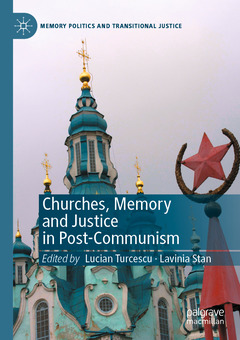Description
Churches, Memory and Justice in Post-Communism, 1st ed. 2021
Memory Politics and Transitional Justice Series
Coordinators: Turcescu Lucian, Stan Lavinia
Language: English
Subject for Churches, Memory and Justice in Post-Communism:
Publication date: 08-2022
Support: Print on demand
Publication date: 08-2021
282 p. · 14.8x21 cm · Hardback
Description
/li>Contents
/li>Biography
/li>Comment
/li>
Part 1: Central Europe.- 1 Catholic Church, Stasi, and Post-Communism in Germany.- 2 Lustration and the Roman Catholic Church in Poland.- 3 Religion and Transitional Justice in the Czech Republic.- 4 Slovakian Catholics and Lutherans Facing the Communist Past.- Part 2: The Balkans.- 5 The Romanian Orthodox Church Rewriting Its History.- 6 Bulgaria: Revealed Secret, Unreckoned Past.- 7 Transitional-Unconditional Justice? The Case of the Catholic Church of Albania.- Part 3: The Baltic Republics.- 8 Comfortably Numb: The Estonian Evangelical Lutheran Church during and after the Soviet Era.- 9 The Lutheran and Roman Catholic Churches in Latvia.- 10 The Roman Catholic Church in Lithuania and Its Soviet Past.- Part 4: Former Soviet Republics in Europe.- 11 The Russian Orthodox Church and Its Communist Past.- 12 Restorative Justice and Orthodox Church in Belarus.- Conclusion.
Lavinia Stan is Jules Leger Research Chair in Political Science and Coordinator of the Public Policy and Governance Program at St. Francis Xavier University, Canada. A comparative politics specialist, she has done work and published mainly on transitional justice, as well as religion and politics, with a focus on post-communist settings. Some of her most recent publications include Transitional Justice and the Former Soviet Union: Reviewing the Past, Looking toward the Future (co-edited with Cynthia Horne, 2019) and Post-Communist Transitional Justice: Lessons from Twenty-Five Years of Experience (co-edited with Nadya Nedelsky, 2015).
Lucian Turcescu is Professor, Graduate Program Director, and past Chair (2011-2016) of the Department of Theological Studies at Concordia University Montreal, Canada. He has done research, published, and taught in several areas, including early Christianity, religion and politics, and ecumenism. Some of his recent publications include Justice, Memory and Redress in Romania (co-edited with L. Stan, 2017), Church, State, and Democracy in Expanding Europe (co-authored with L. Stan, 2011).



